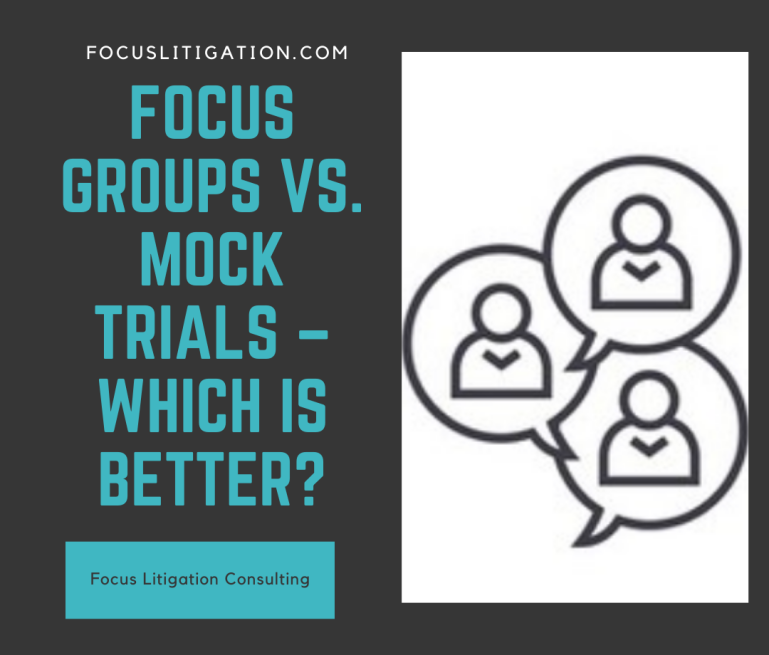
Jury research is a very powerful tool. The participants in the litigation gain valuable information about the strengths, risks, and weaknesses of the case by testing various pieces of evidence and themes in front of groups of people. These groups of people are widely known as focus groups, and they provide valuable information that can help when making decisions about trial strategy, settlements, as well as witness preparation.
Clients, together with their defense team, can also organize mock trials, as part of their jury research efforts. Mock trials provide in-depth information about the case and the best strategies to implement during the actual trial. Both focus groups and mock trials are excellent jury research tools, but their costs can be prohibitive for many clients.
What’s more, they are quite time-consuming in terms of preparation. Because of this, clients often choose only one option – they either choose a Miami trial focus group or a mock trial. But which tools provide the best information – a Broward trial focus group or a mock trial? Let’s take a look at the pros and cons:
Advantages and disadvantages of focus groups
Potential jurors often have pre-existing opinions, which can negatively impact your case. Also, the litigation strategy has to take into consideration these pre-existing opinions. Miami trial focus groups have a major advantage – they uncover and provide information about these implicit opinions, assumptions, questions, and reactions.
Obviously, both positive and negative opinions are important to the case and can affect the litigation strategy, the settlement, and the possible outcome of the case. Broward trial focus groups essentially explore jurors’ personal experiences, opinions, and concerns surrounding the case, revealing various expectations and prejudices which can affect the case.
Focus groups are critically important during the discovery phase of the trial before the depositions have been taken. They provide information for witness preparation, case strategy, and case themes. For instance, let’s say that a law firm is working on a food poisoning case, where the plaintiff is only seeking remediation. At the beginning of the focus group, the jurors asked “how many people are sick?”, even though the plaintiff is only seeking remediation. This question shows that the trial strategy must firstly neutralize the automatic assumption that “there are many sick people”.
Although Broward trial focus groups provide a lot of important information that can be used during the trial, the information is not externally valid. This means that the range of damages awarded or the final verdict cannot be deduced.
The results you get during a focus group are not relevant to the actual case and are not considered valid. Essentially, focus groups are considered exploration research tools, and they do not match the courtroom environment: there are no opening statements, witnesses, closing arguments, and no deliberations. Therefore, the ability to generalize the results are limited.
The type of information you can learn with a focus group:
- What are the juror-initiated themes? How can they be used during the trial?
- What questions do the jurors have?
- What is important for them and what is not important?
- What information about the case is confusing?
Advantages and disadvantages of mock trials
Mock trials are comprehensive research tools that provide extensive information during the discovery phase of a case. They are more comprehensive than Miami trial focus groups, and are generally more costly, and take more time to organize. Mock trials have three important goals:
- they offer the chance of testing potential case strategies and themes
- they elicit evaluations of key witnesses
- they help attorneys gain an understanding of how the jurors think and how they reach a conclusion
A mock trial provides excellent information about the possible reactions of a jury to your case, and how you present it. Similarly, you get additional information about evidence, witnesses, and other important facts. A mock trial also includes the deliberation phase, where jurors explain how they respond to the arguments, the evidence, and the legal strategy. Mock trials are excellent sources of feedback about the strengths and weaknesses of the case. They provide information about the best strategy to implement during the actual trial.
A good mock trial provides more external validity than a focus group. For instance, generalizations can be made from the information acquired during the mock trial. However, these generalizations cannot be used to predict the actual outcome of the real trial. You get excellent information, usually better and more comprehensive than in a focus group, but predictions are not accurate. The limitations of mock trials include:
- you cannot get information about the actual verdict you receive at the actual trial
- you cannot get information about the specific damages you may be awarded at the actual trial
- typically, mock trials are conducted after the discovery phase is completed, often within days before the actual trial begins; this means that the information gathered during the mock trial cannot be used to adequately adapt the litigation strategy; for instance, the new evidence cannot be provided, and new witnesses are difficult to contact; simply put, acting on the ideas generated by the mock trial is difficult and attorneys may not have enough time to adapt to these changes;
Keep in mind that during the time between the mock trial and the actual trial, many changes can occur, affecting the case and your strategy. Because of this, mock trials cannot be used to predict the actual trial results.
The type of information you can learn during a mock trial:
- What are the themes that may work or not work during the actual trial?
- How do jurors respond to various pieces of evidence, questions or witnesses?
- What is the range of damages that is appropriate?
- What type of evidence or other information should not be used during the trial?
